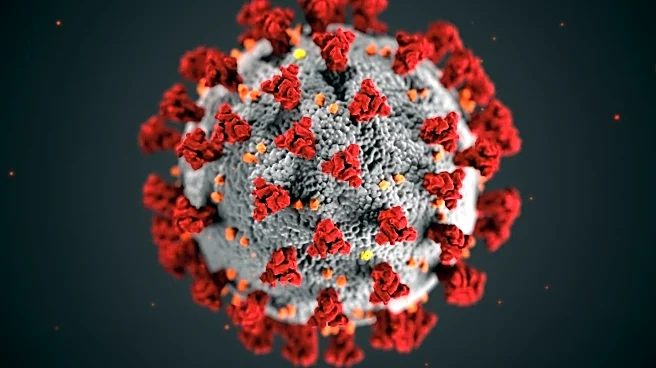What's Happening?
A recent study has explored the potential of natural phytochemicals in targeting the spike protein variants of SARS-CoV-2, the virus responsible for COVID-19. The research utilized molecular docking techniques to assess the binding potentials of 20 active
compounds from plants such as Smilax excelsa L. and Opuntia ficus indica, alongside FDA-approved drugs like ivermectin and remdesivir. These compounds were tested against the spike proteins of both the wild-type virus and its variants, including Alpha, Beta, Delta, and Omicron. The study found that compounds such as ursolic acid, betulinic acid, and ivermectin showed significant binding affinities, suggesting their potential to interfere with the virus's ability to bind to the human ACE2 receptor. The findings highlight the possibility of using these natural compounds as therapeutic agents against COVID-19.
Why It's Important?
The identification of natural compounds that can effectively bind to SARS-CoV-2 spike proteins is significant in the ongoing fight against COVID-19. As the virus continues to mutate, leading to new variants with increased transmissibility and potential immune escape, finding alternative therapeutic options becomes crucial. The study's results suggest that phytochemicals like ursolic acid and betulinic acid could offer a complementary approach to existing treatments, potentially enhancing the efficacy of current antiviral strategies. This research could pave the way for developing new, plant-based antiviral drugs, which may be more accessible and cost-effective, especially in regions with limited access to conventional pharmaceuticals.
What's Next?
Further research is needed to validate these findings through clinical trials and to explore the safety and efficacy of these phytochemicals in humans. If successful, these compounds could be integrated into treatment protocols for COVID-19, particularly in managing infections caused by emerging variants. Additionally, the study opens avenues for exploring other natural compounds with similar properties, potentially broadening the arsenal of tools available to combat the pandemic. Collaboration between researchers, pharmaceutical companies, and regulatory bodies will be essential to expedite the development and approval of these potential treatments.
Beyond the Headlines
The study underscores the importance of exploring traditional medicine and natural compounds in modern drug discovery. It highlights a growing interest in integrating natural products into mainstream healthcare, which could lead to more sustainable and diverse treatment options. Moreover, the research reflects a broader trend of utilizing computational methods, such as molecular docking, to accelerate the drug discovery process, offering a glimpse into the future of pharmaceutical research.
















